This article was co-authored by Ken Breniman, LCSW, C-IAYT and by wikiHow staff writer, Glenn Carreau. Ken Breniman is a Licensed Clinical Social Worker, Certified Yoga Therapist and Thanatologist based in the San Francisco Bay Area. Ken has over 15 years experience of providing clinical support and community workshops utilizing a dynamic combination of traditional psychotherapy and yoga therapy. He specializes in eclectic non-denominational yoga guidance, grief therapy, complex trauma recovery and mindful mortal skills development. He has a MSW from Washington University in St. Louis and an MA Certification in Thanatology from Marian University of Fond du Lac. He became certified with the International Association of Yoga Therapists after completing his 500 training hours at Yoga Tree in San Francisco and Ananda Seva Mission in Santa Rosa, CA.
This article has been viewed 14,691 times.
The death of a baby is an unimaginable loss for everyone involved. You can support a grieving person in their time of need when you speak with empathy, sensitivity, and patience. Moving forward will take time, but kind words go a long way. Read on to find out how you can offer the most comfort and care after a baby passes.
Steps
"I know you're hurting right now."
-
Help grieving parents feel less alone by acknowledging their loss. Some don't know what to say and decide it's better to not say anything, but this can actually make the parents feel more isolated.[1] X Research source Be willing to acknowledge what happened, especially by saying that the child "died," as it affirms to the parents that their baby lived for a brief time.
- "I'm sorry you're going through this, and I love you very much."
- "I'm so sorry your baby died. How have you been feeling?"
"I'm so sorry for your loss."
-
Use a simple, heartfelt statement to comfort grieving individuals. "I'm sorry" might feel inadequate, but it's actually reassuring to hear. There's no need to overthink your response to a tragedy. Express your concern for the grieving person, and don't worry about making a big, moving speech.[2] X Trustworthy Source HelpGuide Nonprofit organization dedicated to providing free, evidence-based mental health and wellness resources. Go to source At the end of the day, it'll help them most just to know that you care.
- "I know how much you loved her. I'm sorry for your loss."
- "My family and I are grieving with you. You're not alone."
- "He'll always be your son. I'm sorry he left us so soon."
"I don't know what to say."
-
Honesty is better than pretending you know what to say. The death of a baby is devastating, and it's okay to be at a loss for words. Just offer a shoulder to cry on and say, "I'm not sure what to do, but I want you to know that I'm here for you." [3] X Research source
- "I can't imagine what you're going through."
- "I don't know what to say right now, but I'll do whatever you need."
- "I'm lost for words, but you'll always have a shoulder when you need it."
"How can I help?"
-
Let grieving parents know you want to help them however you can. Don't assume you know what they need because everybody reacts to loss differently. The best way to help somebody after a baby dies is to ask them what they need and let them know you're happy to do it.
- "My heart goes out to you. What can I do?"
- "Please let me know if there's anything I can do to help."
- Be aware that people in mourning might refuse your help. Accept this gracefully, without insisting. There will be chances to offer help in the future that they may take you up on.[4] X Trustworthy Source HelpGuide Nonprofit organization dedicated to providing free, evidence-based mental health and wellness resources. Go to source
"Can I bring you some food?"
-
Sometimes, it's difficult for grieving people to ask for help outright. If they don't know what you can do to help, make a practical suggestion. Offer to get groceries, make a meal, take care of housework, or drive them somewhere. There are many little ways to make someone's life easier when they're in pain.[5] X Trustworthy Source HelpGuide Nonprofit organization dedicated to providing free, evidence-based mental health and wellness resources. Go to source
- "Let me do your chores around the house for now. You have enough on your plate."
- "I'd be happy to bring you dinner this week. Is there anything specific I can make?"
- "Can I buy you lunch or take you to a movie? We can do something you enjoy."
"You and Alex are in my thoughts."
-
Hearing the baby's name can bring comfort to parents. Some people assume grieving parents won't want to say their child's name, but often, the opposite is true. Parents will typically want to talk about their baby and openly use their child's name in conversation. Do the same, and say the baby's name to show parents that you know they're grieving a real person.
- "I love that name. It's a special name for a special child."
- "Let me know if you ever don't want me to say his name. I'll adjust to your comfort levels."
- It's still a good idea to check with the parents and ask if they're okay with you using the baby's name, rather than assuming you know how they feel.
"I'm here to listen."
-
Grieving people often need to tell their stories to heal. Offer to listen and let them talk about their baby's life and death in as much detail as they choose to give. It will likely be painful to hear, but it's how they process and accept the baby's passing. When you offer to listen and give silent support, you're actually going above and beyond to aid the healing process.[6] X Trustworthy Source HelpGuide Nonprofit organization dedicated to providing free, evidence-based mental health and wellness resources. Go to source
- "You can tell me anything, no matter how painful. I'll listen."
- "If you want to talk about your baby, I'm more than willing to listen."
"Is it okay if I check in sometimes?"
-
Keep offering support after the baby's death. Remember that the pain of loss continues after everything is said and done, so having a strong support system is crucial.[7] X Research source Check in periodically—and make a point to tell them that they're not obligated to respond if they don't want to.
- "How are you? I don't expect you to bounce back right away; I just want you to know I care."
- "I know next week is your baby's birthday. Do you need anything?"
- "You don't have to reply if you don't want to, but how have you been? I was just thinking of you the other day."
"Can we honor the baby's memory somehow?"
-
Show the parents they're not alone in mourning, even when time passes. Suggest ways to commemorate the baby's life and ask parents how they would prefer to celebrate their child. This could be something simple yet meaningful, like making a scrapbook or planting flowers in their name.[8] X Research source
- "Is there something you want to do to remember your baby? I'm happy to help make it happen."
- "Is there an organization I can support in your baby's name?"
- "A community walk would be a great way to remember her together. Would you like help to organize it?"
- Be careful about inserting yourself into the celebration, as the parents may want to celebrate privately. However, depending on your relationship, they may appreciate your participation.
"Take all the time you need."
-
Reassure the parents that there's no time frame or wrong way to grieve. Mourners should know that nothing and nobody can force them to move on from a tragic loss and that they're allowed to process grief in their own time. Be that person for them, and remind them that you won't lose your patience on a bad day or difficult time of year.[9] X Research source
- "Give yourself time to heal. You deserve it."
- "Take care of yourself and take your time. I'll be waiting if you ever need anything."
- "It's okay to be not okay. You deserve to grieve at your own pace."
Watch out for upsetting statements.
-
When you comfort someone, make sure you don't diminish their pain. Even if you have the best intentions, it's important to empathize with the grieving person and consider what might help them. Statements encouraging parents of a deceased child to look on the bright side can invalidate their pain, which isn't helpful.[10] X Research source
- For example, saying "You can always have another baby" to a mother disregards her feelings about the baby she lost. Rather, try "Nobody can replace him, but I hope you get the chance to try again when you're ready."
- Other statements to avoid include "Maybe it's for the best," "You'll get over it eventually," and "Everything happens for a reason."
You Might Also Like
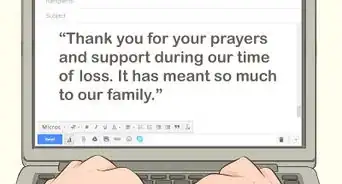


-Step-20-Version-2.webp)







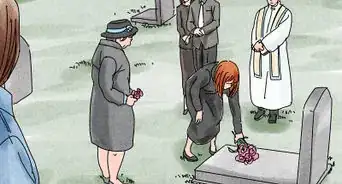


References
- ↑ https://www.psychologytoday.com/us/blog/laugh-cry-live/201911/the-power-your-words-when-baby-dies
- ↑ https://www.helpguide.org/articles/grief/helping-someone-who-is-grieving.htm
- ↑ https://www.thewomens.org.au/health-information/pregnancy-and-birth/pregnancy-problems/when-a-baby-dies/grief-after-the-death-of-a-baby
- ↑ https://www.helpguide.org/articles/grief/helping-someone-who-is-grieving.htm
- ↑ https://www.helpguide.org/articles/grief/helping-someone-who-is-grieving.htm
- ↑ https://www.helpguide.org/articles/grief/helping-someone-who-is-grieving.htm
- ↑ https://www.thewomens.org.au/health-information/pregnancy-and-birth/pregnancy-problems/when-a-baby-dies/grief-after-the-death-of-a-baby
- ↑ https://www.childbereavementuk.org/information-when-your-baby-dies
- ↑ https://www.childbereavementuk.org/information-when-your-baby-dies
About This Article




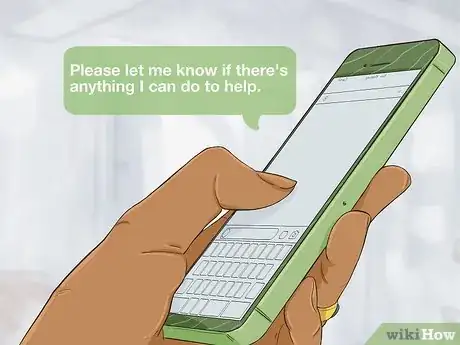


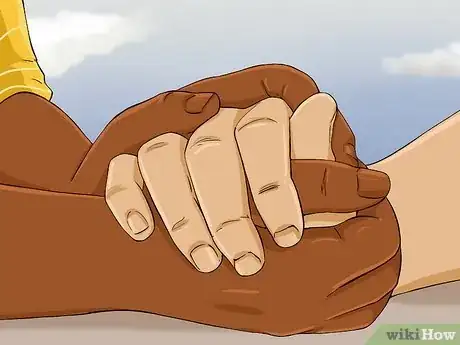
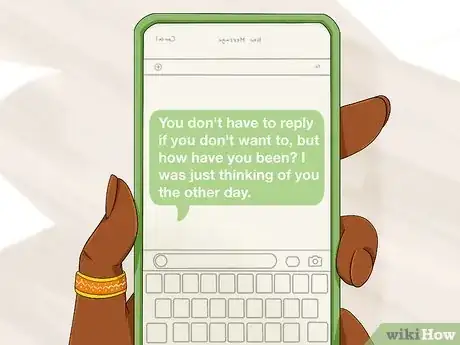


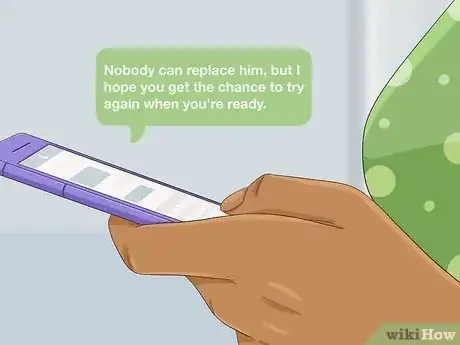









-Step-20-Version-2.webp)


































